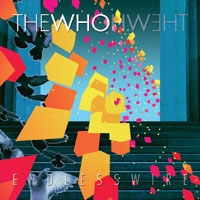SXSW 2007 Keynote Interview: Pete Townshend Page 2
 Originally, the chemistry of the Who was very chaotic but very internalized. We didn't understand how it worked; it just worked. When [drummer] Keith [Moon] died, and we temporarily replaced him with Kenney [Jones], I felt we had a drummer who would do new things and change me. But in fact, the chemistry didn't work in the way it had worked - and a lot of old Who fans missed that original chemistry.
Originally, the chemistry of the Who was very chaotic but very internalized. We didn't understand how it worked; it just worked. When [drummer] Keith [Moon] died, and we temporarily replaced him with Kenney [Jones], I felt we had a drummer who would do new things and change me. But in fact, the chemistry didn't work in the way it had worked - and a lot of old Who fans missed that original chemistry.
When John was still alive, the chemistry between him and me still inferred in the ether, as it were, a phantom Keith Moon. And [current drummer] Zak [Starkey] could pretend to be that man, but he couldn't actually do it, not really. And why should he? I mean, he's his own man, a brilliant drummer. So when John passed away, suddenly there was Zak and me - and then what I realized was that he and I have our own extraordinary chemistry, and it's innate. It's a chemistry based on the fact that, whatever I do, he's already doing it.
In a sense, John's death opened up the same kind of possibilities for Roger and me. The chemistry we have today is completely different, but it's just as effective - and it enabled us to make our new record [Endless Wire, read review]. I think if John had been alive, it would've been much, much, much tougher to make a new record.
ON "THE FUNCTION OF ROCK"
The post-Beatles bands in England - like the Rolling Stones, the Who, the Animals, and many others - looked at the American-music tradition and saw that it was almost a three-legged chair: country, blues, and pop. And what we brought to that three-legged chair was the British postwar condition of growing up in an atmosphere of absolute denial. I was born in May 1945. The war was just being tidied up. But nobody spoke about what had happened. So what we brought to American music was - not anger, although it looked like anger, particularly in the Who. It was frustration, and a demand for answers - which, to be honest, to this very day, we have never had.




























































